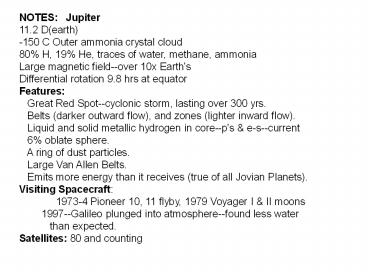NOTES: Jupiter - PowerPoint PPT Presentation
1 / 22
Title: NOTES: Jupiter
1
NOTES Jupiter 11.2 D(earth) -150 C Outer
ammonia crystal cloud 80 H, 19 He, traces of
water, methane, ammonia Large magnetic
field--over 10x Earth's Differential rotation 9.8
hrs at equator Features Great Red
Spot--cyclonic storm, lasting over 300 yrs.
Belts (darker outward flow), and zones (lighter
inward flow). Liquid and solid metallic
hydrogen in core--p's e-s--current 6
oblate sphere. A ring of dust particles.
Large Van Allen Belts. Emits more energy than
it receives (true of all Jovian
Planets). Visiting Spacecraft 1973-4 Pioneer
10, 11 flyby, 1979 Voyager I II moons
1997--Galileo plunged into atmosphere--found less
water than expected. Satellites 80
and counting
2
Jupiter 11.2 D(earth) -150 C Outer ammonia
crystal cloud
3
80 H, 19 He, traces of water, methane, ammonia
4
Large magnetic field--over 14x Earth's In
magnitude, 1,000x the energy content.
5
Differential rotation 9.8 hrs at equator, 11
hours at the poles.
6
Features Great Red Spot--cyclonic storm, size
of several Earths, lasting over 300 yrs.
7
Belts (darker inward flow), and zones (lighter
outward flow).
8
(No Transcript)
9
Liquid and solid metallic hydrogen in core caused
by pressure --protons electrons?current? strong
magnetic field.
10
Jupiter and all the gas giants are oblate
spheroids. Why? Centrifugal force and tidal
force from sun.
Jupiter 6 oblate sphere.
11
A ring of dust particles in the path of the moon,
Io. Also, large Van Allen Belts.
12
Emits more energy than it receives (true of all
Jovian Planets). The planet is still contracting
and converting gravitational Energy into heat.
13
Early Visiting Spacecraft 1973-4 Pioneer 10, 11
flyby, 1979 Voyager I II moons
14
1997--Galileo dropped probe into
atmosphere --found less water than expected.
15
Then Galileo went on to explore the moons of
Jupiter --up closer and personal!
Satellites 80 and counting 4 Galilean moons
about size of Mercury.
16
Io 9 volcanic plumes, unique surface
volcanism, terraced hills at poles.
17
This Voyager image of Ra Patera, a large shield
volcano on Io, shows colorful flows up to 200
miles long emanating from the dark central
volcanic vent.
18
Io, the pizza crust moon Heated by tidal force of
big passing moons.
19
Europa--streaks and fissures in ice crust a few
km wide. Life underneath ice? --liquid subsurface
ocean?
20
(No Transcript)
21
Ganymedelargest Jupiterian moon, had plate
techtonics in past, multiple parallel ridges like
ruffled potato chip, cratering. dark region of
original surface.
22
Callistomost battered moon in the solar
system --vast crater-Valhalla--with ruffled
rings, ice rock.































